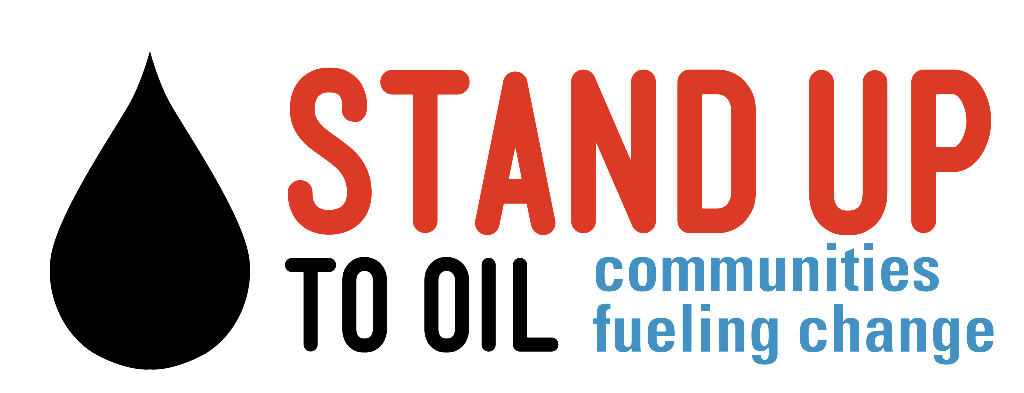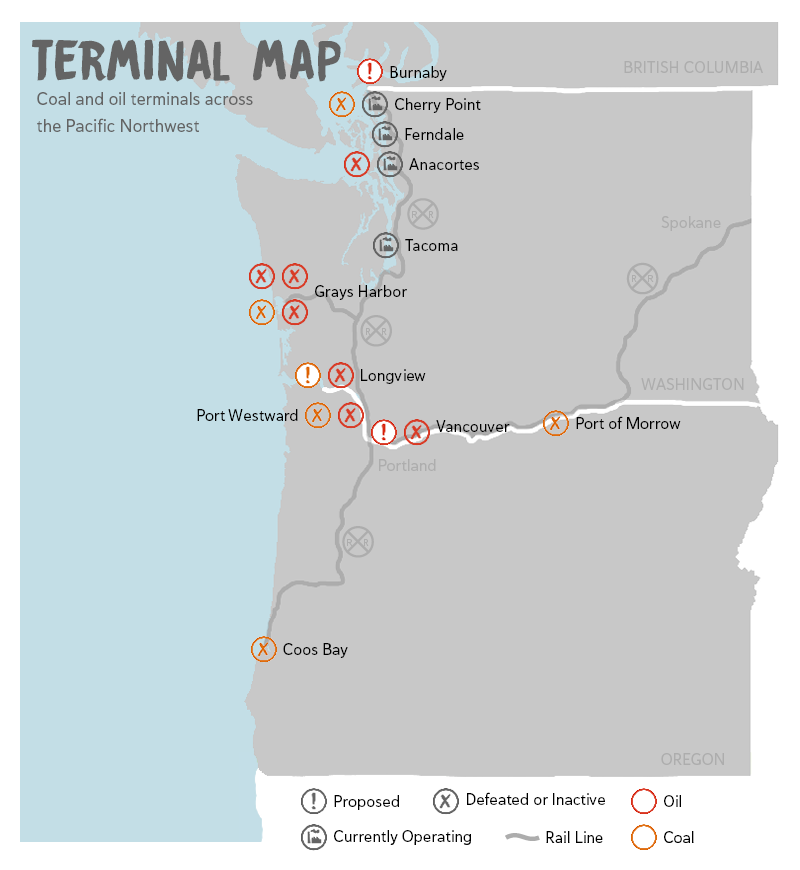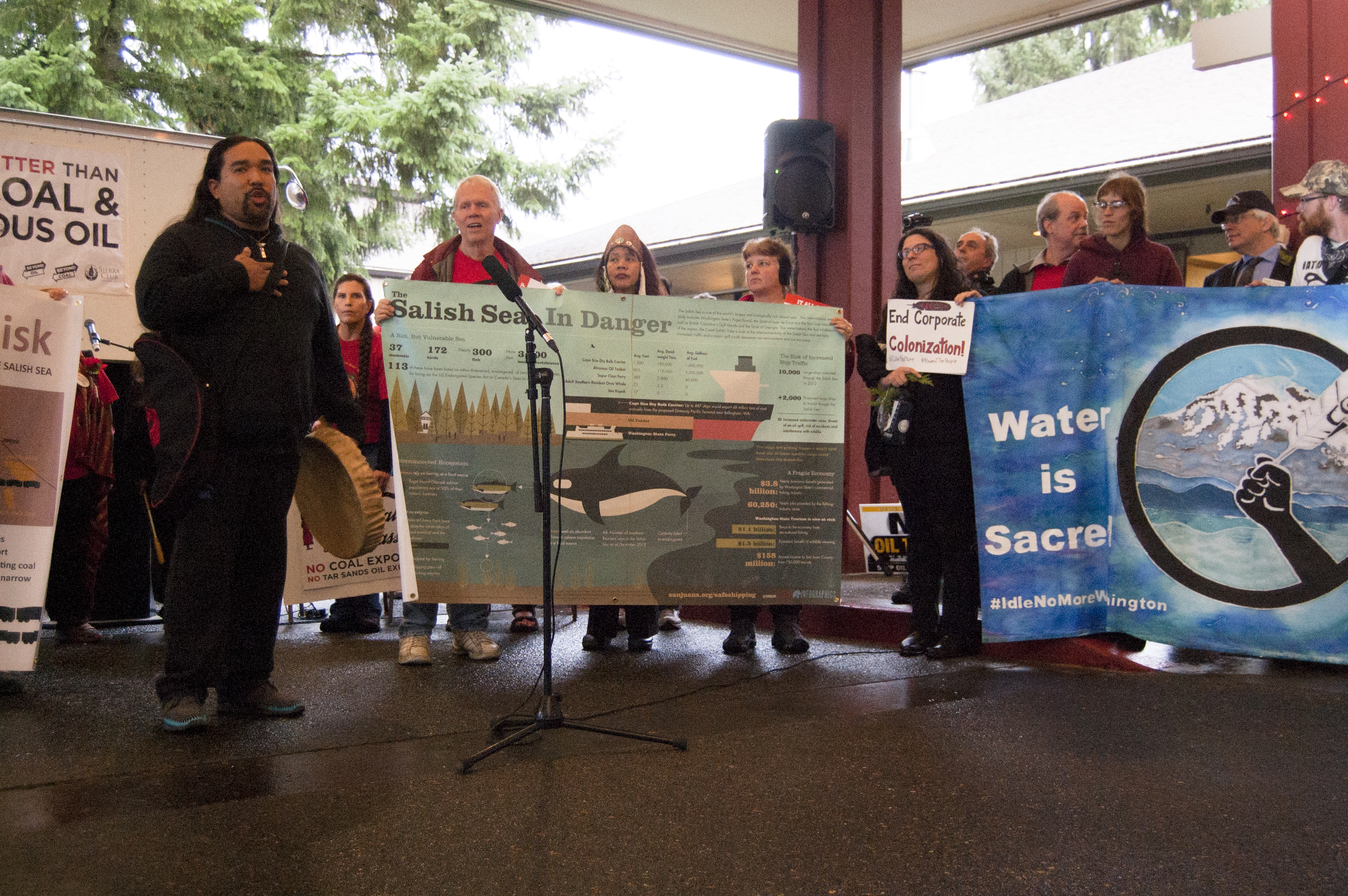Oil Terminals
If built, proposed new and expanded terminals would dramatically increase the amount of oil handling capacity in the Northwest, from a capacity of around 376,000 barrels a day to over 1 million barrels a day. That is significantly more than the Keystone XL pipeline would have moved (830,000 barrels/day).
Oil terminals make poor neighbors. People living near the proposed terminals would be exposed to some of the same problems as neighbors of existing refineries including air pollution, safety risks, odor and noise.
Here are some of the largest and most controversial proposals, where communities are actively fighting them.
Click on the map to the right to see where the terminals are located across the Pacific Northwest >>
Columbia River
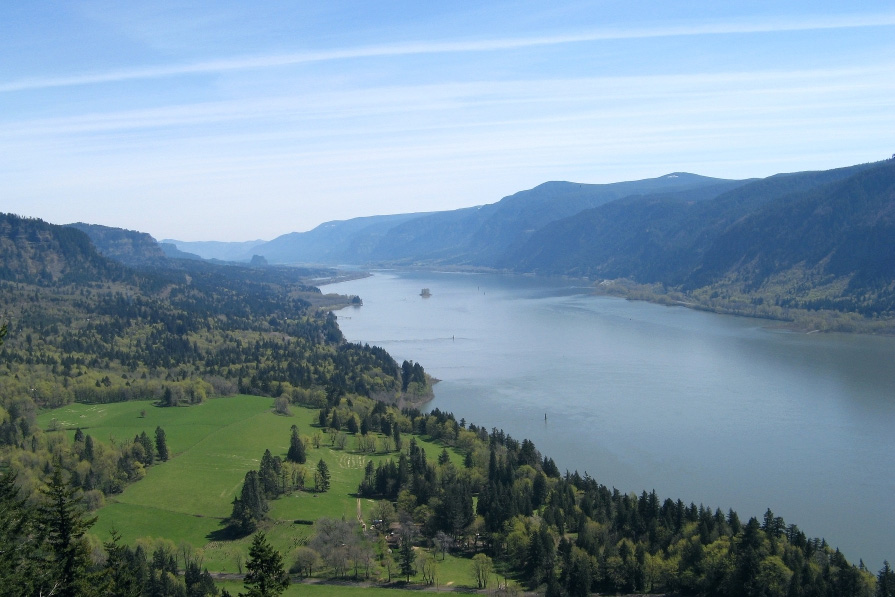
Tesoro Savage Oil Terminal (Vancouver, WA) – DEFEATED!
If built, Tesoro Savage would be the largest crude oil by rail terminal in the nation. With a capacity to handle 360,000 barrels per day four trains would be needed daily to deliver the oil and nearly filling a tanker 700 feet in length for shipment down the Columbia River.
Tesoro Savage could deal a major blow to Vancouver’s economy and quality of life. The project is in direct conflict with a $1.3 billion waterfront redevelopment plan that would build 3,300 new homes, as well as restaurants, shopping and office space. Twenty-two city blocks of the waterfront development would be within 100 feet of the rail line.
Tesoro Savage’s proposal is opposed by the Vancouver City Council, ILWU Local 4, Columbia Waterfront LLC, the Cities of Washougal and Spokane, the Columbia River Inter-tribal Fish Commission, the environmental community, and people from all walks of life across the Northwest. Learn more about this project here.
NuStar Energy (Vancouver, WA) – Defeated
NuStar Energy currently operates a bulk terminal at the Port of Vancouver on the Columbia River. The company is proposing to retrofit their facility to become an oil-by-rail terminal. NuStar Energy wants to receive an average of 22,000 barrels of crude oil per day. The company submitted its proposal to the City of Vancouver days before the City passed a moratorium on any new crude oil projects. Since NuStar Energy is proposing to retrofit their existing facility fewer permits required.
Global Partners (Port Westward, OR) – Operating
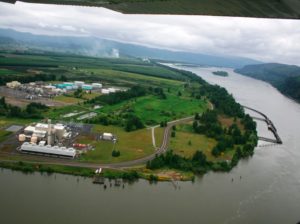
Global Partners’ site at Port Westward, OR
In 2013, Global Partners bought the Columbia Pacific Bio-Refinery at Port Westward on the Columbia River, a facility with a checkered past that includes millions in public subsidies and a 2009 bankruptcy. Without public input, Global transitioned the facility quietly and quickly from an ethanol facility into a crude oil terminal. Global Partners then began shipping crude oil from Port Westward near Clatskanie, Oregon. Seemingly overnight, Global Partners began receiving up to 30,000 barrels of crude oil per day.
In 2013, Global Partners violated its permit and shipped six times more crude oil than was allowable through their Port Westward terminal. The State of Oregon found that their actions were so egregious they labeled them a “serious violation” of state law. Yet, instead of shutting the oil terminal down, the Oregon Department of Environmental Quality issued a nominal fine and granted a permit for a massive expansion in 2014. Global continues to operate under air permits and spill contingency permits issued by DEQ in 2014.
Since then, the global oil sands have shifted. World prices for crude oil plummeted, impacting companies throughout the industry. Global Partners was no exception, and in early 2016 Global laid off over half of the terminal workers and suspended oil transportation. Since 2016, Global Partners has primarily handled ethanol.
In 2017 and 2018, Global took significant steps towards re-starting and expanding shipments of crude oil its Port Westward site. Despite strong opposition from people in Columbia County (where Port Westward is located) and uprail communities along the Columbia River, Global continues to push for expanded oil train shipments, oil storage capacity, and more oil tankers on the Columbia River. Unfortunately, Oregon’s state agencies have abetted Global’s effort to piecemeal together a large oil terminal capable of handling either Bakken crude or heavy tar sands oil.
- In 2017, Global Partners sought to purchase additional oil storage tanks capacity at Port Westward, raising the potential for renewed and increased oil train traffic through the Columbia Gorge, Portland, St. Helens, Scappoose, and Rainier to Port Westward in the future. Despite fierce objections from local residents and members of the Stand Up to Oil campaign, the Public Utility Commission of Oregon approved the tank sale in June 2017—a move that could allow more oil train traffic as oil prices rebound.
- In December 2018, the Port of Columbia County approved a change to allow Global to handle heavy oil at its Port Westward facility. This change, again taken in the face of strong objections from local cities, activists, and members of the Stand Up to Oil campaign, could facilitate Global becoming a major export hub of Canadian tar sands crude.
In 2019, we will continue to watchdog Port Westward’s potential for additional oil-by-rail developments. Columbia Riverkeeper and 1000 Friends of Oregon are challenging an effort by the Port of Columbia County to rezone neighboring farmland for heavy industrial uses, which could be linked to more oil train infrastructure at Port Westward. And local public safety advocates and members of the Stand Up to Oil campaign will push for the Oregon Department of Environmental Quality to closely scrutinize Global’s changing footprint, which could include new pipeline capacity, new and larger tanks than those allowed in DEQ’s permits, and the handling of heavy oil not contemplated in Global’s current spill plans. All of these changes would translate to more oil trains coming through Vancouver, Portland, Columbia County cities and towns, and the Columbia River Gorge.
Zenith Energy (Portland, OR) – Operating
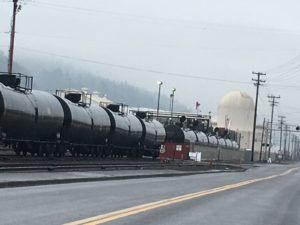
Oil trains unloading at Zenith – photo by Columbia Riverkeeper
In 2014, OPB reported that a former asphalt terminal in Portland had begun to handle crude oil trains. In 2018, after a hiatus in oil shipments, the same facility was purchased by Zenith Energy, and it began moving rail shipments of tar sands oil through Portland. Now in 2019, the terminal could increase its throughput of trains carrying the world’s dirtiest fuel in Portland, OR, and other communities along the Columbia River. Zenith Energy wants to expand shipments of heavy tar sands crude at its Willamette River facility in Portland to one train per week, or possibly more. Mile-long trains transporting tar sands oil to Portland would travel along the Columbia River. Despite the City of Portland’s opposition to crude oil trains and efforts to legislate against new fossil fuel infrastructure, Zenith began building new rail unloading infrastructure to handle heavy oil in early 2018. In February 2018, Portland Mayor Ted Wheeler expressed opposition to Zenith’s expansion plans.
Like Global Partners at Port Westward, the Zenith terminal would move heavy tar sands oil. The potential for a sinking oil spill in the Willamette or Columbia River adds severe environmental risks to crude oil trains that are also known to pose unacceptable public safety hazards. Learn more about tar sands and Zenith’s dangerous plans.
Washington Coast

Photo credit: Ben Nieves
Three major proposed oil terminals in Grays Harbor, near Aberdeen and Hoquiam on the coast, would have the combined capacity to handle nearly 164,000 barrels daily, fed by three loaded oil train deliveries every day. Of all the places in the Northwest that would be affected by a ramp-up in oil transport, none stands to be as profoundly transformed as Grays Harbor. If these three terminals are built, the risk of collision and oil spills will surge due to the dramatic increase in shipping traffic: major vessel traffic by more than 5 times, and tank vessel traffic by 44 times. That means between 293 and 428 tankers and tug barges annually, full of oil, would have to navigate the shallow, narrow, twelve-mile long shipping channel of Grays Harbor, which has limited deep water areas to stage ships or tugs. Such a huge surge in oil vessel traffic, in a place not suited to them is inviting disaster. A major oil spill could wreak havoc on the Dungeness Crab fishery and many other natural resource-based industries in the area. Marine resource dependent jobs support more than 30% of Grays Harbor’s workforce, according to a 2013 study by the University of Washington.
Westway Terminal Company – Defeated
Westway currently operates a bulk terminal at the Port of Grays Harbor, and is proposing a retrofit to receive 48,918 barrels of crude per day from oil train shipments. Since the company is proposing to retrofit their existing facility, there are relatively few permits required. The Washington Supreme Court breathed life into the Ocean Resources Management Act (ORMA), a state law that protects coastal ocean resources, and ruled that the law’s strict permitting requirements apply to crude oil shipping terminals. The ruling will effectively block a proposed crude-by-rail terminal in Hoquiam.
Imperium Renewables/Renewable Energy Group (REG) – Defeated
This biodiesel facility planned to retrofit its facility at the Port of Grays Harbor to receive crude oil during the height of early 2010s oil price spikes. But in early 2016, REG purchased the assets of Imperium and, after hearing the concerns of local community groups and the Quinault Nation, announced that their future plans would not include crude oil. That being said REG has expressed interest in expanding their facility but their plans are still unknown. We are currently awaiting more clarity from REG and remain vigilant to ensure that a crude oil terminal is not located on the outer coast.
U.S. Development Group – Defeated
In 2012, US Development proposed building a new oil-by-rail terminal that would have received 45,000 barrels of crude per day in Grays Harbor, the same area as the REG and Westway projects. Their proposal put the facility across the water from a National Wildlife Refuge and the project’s permit applications weren’t even discovered until after a public records request. The project was unanimously opposed by the nearby Aberdeen City Council and numerous community led organizations. In April 2016, the company opted out of its lease agreement with the port, quietly ending its bid to ship crude oil across Washington and through the state’s coastal waters.
Learn more about how Grays Harbor is saying no to oil – and what you can do to help.
Puget Sound & the Salish Sea
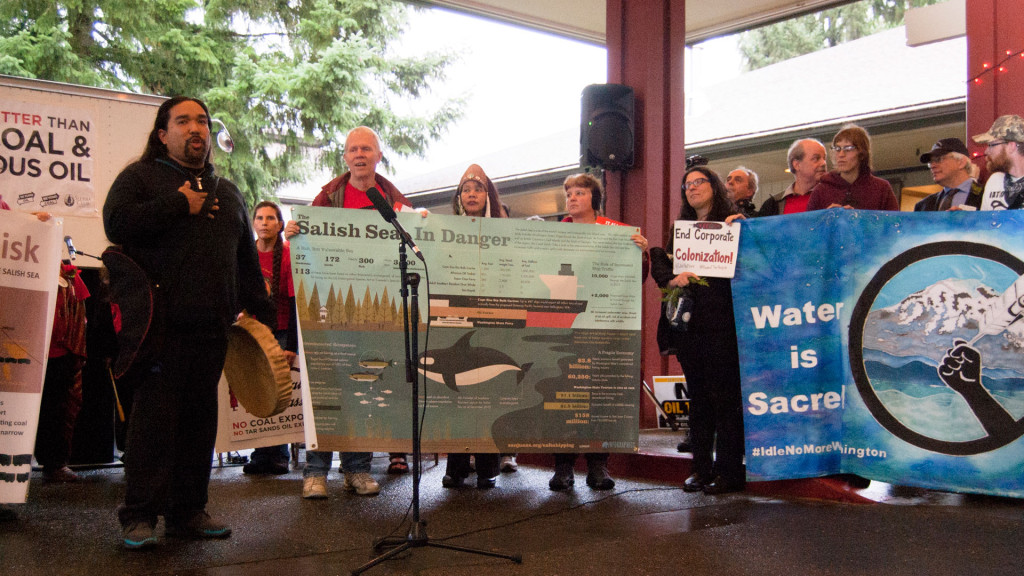
Photo credit: Natalie Jamerson
Shell Oil (Anacortes, WA) – Defeated
In another sign that crude-by-rail is a losing proposition, Shell Puget Sound Refinery in Anacortes recently announced that it is dropping its plans to construct a crude-by-rail facility. Originally proposed in 2014, community opposition and legal challenges forced Shell and Skagit County to undertake a full environmental and public health review under the State Environmental Policy Act. That delay, growing local and regional opposition, and uncertain economics contributed to Shell’s decision.
“This is an extraordinary victory for the people of Skagit County and Washington State,” said Kristen Boyles, an attorney at Earthjustice who represented conservation groups in their legal challenge. “Having a full and transparent public process exposed everyone – including apparently Shell itself – to the risks and harms of this project.”
Sources and Links:
Tesoro-Savage project could sink $1.3 billion waterfront redevelopment plan
Vancouver oil terminal would have largest oil-by-rail capacity in U.S.
Vancouver Council approves resolution opposing Tesoro-Savage project
Impact of oil terminals would transform Grays Harbor
Hoquiam City Council votes for moratorium on future oil terminals
Shell’s plans to increase oil trains in Anacortes hits snag
Northwest Oil Spills: The Raw Data and the Growing Risk
